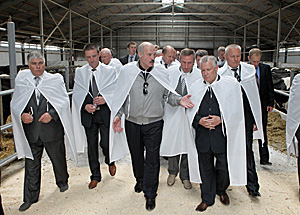News & Events in Belarus
Belarus’ dairy holding companies should harmonize export strategies

KLICHEV DISTRICT, 24 May (BelTA) – Dairy holding companies established in Belarusian regions should harmonize their export strategies, President of the Republic of Belarus Alexander Lukashenko said during his working trip to Klichev District, Mogilev Oblast, on 24 May, BelTA has learnt.
Development prospects of dairy holding companies were discussed by the example of Mogilev-based dairy producer Babushkina Krynka. At present its production capacities are estimated at 1 million tonnes per year. The holding company buys raw materials from 17 out of 21 districts of Mogilev Oblast. These districts sell 80% of milk produced in the region. The export of the holding company exceeded $172 million in 2012. The company exports about 70% of its products. The revenues made up $113,000 per one employee.
Mogilev Oblast Governor Piotr Rudnik informed that the establishment of such a major holding company allowed developing a single pricing policy. Now dairy products made in Mogilev Oblast are marketed abroad under the single brand “Babushkina Krynka”. This allows maximizing sales profits. “This brand can challenge major Russian and international companies,” the Mogilev Oblast Governor said.
Alexander Lukashenko warned against excessive competition with similar holding companies from other regions. “Compete, but this competition should not result in lower prices on external markets,” the Belarusian leader said.
Director General of the Management Company of Babushkina Krynka Holding Company Igor Kononchuk noted that the prices for dairy products on the domestic market have not risen since 1 January, while export prices increased considerably and the products are sold solely on condition of prepayment. He said that the industry benefits from Belarus’ participation in the Customs Union and the Single Economic Space. “This union was very helpful, in particular, for our industry,” the Director General said.
Alexander Lukashenko drew attention to several key challenges. One of them is maintaining the high quality of products and excellent reputation against the backdrop of tough competition. Another challenge is improving the work with suppliers of raw materials.
The President was informed about the performance of the dairy farms built in accordance with Decree No. 332 dated 13 June 2008. The document envisaged the construction of about 118 dairy farms. Each of them was supposed to become a model farm in every district. Currently, the livestock on these farms amount to 86,000 head, which is their designed capacity. Returns on sales are high enough, yet vary widely. Last year, 58 farms reported returns on sales of more than 30%, 54 farms - 10 to 30% and 6 farms - less than 10%.
Alexander Lukashenko expressed dissatisfaction with the underperformance of some of these farms. “We have built these 118 farms in order to teach others. They are supposed to be the flagships, the role models for others,” said the head of state.
The President explained that the next step in this direction will be the modernization of 1,200 farms across the country and converting them into dairy facilities so that they would be as efficient as these 118 farms constructed in accordance with the Decree.
Another problem is provision of farms with highly qualified personnel. According to officials, it is one of the reasons why the dairy industry does not perform as efficiently as meat production industry which has been growing steadily. The agricultural universities are expected to help solve this problem.
Alexander Lukashenko underlined that the dairy cattle breeding needs to comply strictly with technological requirements. "Yet, the main thing is the quality of feeds, nutrition, timely feeding and milking," he added.
In Klichev District the head of state visited the Dubrova dairy complex owned by the Dobrovolets agricultural company. The President got acquainted with the modern technological processes of milk production. The head of state visited the Batsevichi dairy farm of the Lenin agricultural company. Here he got familiar with the approaches to the reconstruction of such farms, with the use of wooden structures. As reported to the President, such a project is justified both in terms of quality and price.
In conclusion, Alexander Lukashenko underlined the need to achieve high production standards both in the agricultural and livestock industries, which in turn is essential for the quality, amount and competitiveness of products.
| Su | Mo | Tu | We | Th | Fr | Sa |
|---|---|---|---|---|---|---|







 print version
print version make home page
make home page add to bookmarks
add to bookmarks

